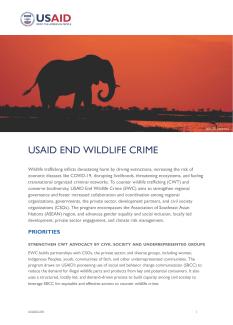Wildlife trafficking inflicts devastating harm by driving extinctions, increasing the risk of zoonotic diseases like COVID-19, disrupting livelihoods, threatening ecosystems, and fueling transnational organized criminal networks. To counter wildlife trafficking (CWT) and conserve biodiversity, USAID End Wildlife Crime (EWC) aims to strengthen regional governance and foster increased collaboration and coordination among regional organizations, governments, the private sector, development partners, and civil society organizations (CSOs). The program encompasses the Association of Southeast Asian Nations (ASEAN) region, and advances gender equality and social inclusion, locally led development, private sector engagement, and climate risk management.
PRIORITIES
strengthen cwt advocacy by civil society and underrepresented groups
EWC builds partnerships with CSOs, the private sector, and diverse groups, including women, Indigenous Peoples, youth, communities of faith, and other underrepresented communities. The program draws on USAID’s pioneering use of social and behavior change communication (SBCC) to reduce the demand for illegal wildlife parts and products from key and potential consumers. It also uses a structured, locally led, and demand-driven process to build capacity among civil society to leverage SBCC for equitable and effective actions to counter wildlife crime.
increase regional collaboration among criminal justice stakeholders
Effective CWT efforts require strong coordination among law enforcement, adjudication, and policymaking networks across the region. EWC collaborates with partners to develop a cohesive training and collaboration strategy, along with a toolkit containing best practice models and standardized regional approaches to enhance learning on CWT. The establishment of training alumni and peer support networks, combined with the facilitation of collaborative events and exchange programs, better prepares law enforcement, adjudication, and policymaking stakeholders to effectively combat wildlife crime.
improve coordination for regional cwt policies and collective actions
To enhance regional CWT policies and collective actions, EWC builds an inclusive coordinated network across Southeast Asia. This approach strengthens partnerships and creates new collaboration opportunities among civil society, leading to the sustainable and locally led design and implementation of CWT initiatives and environmental governance.
ANTICIPATED RESULTS
Civil society actors have improved capacity to lead outreach in line with three SBCC pillars (advocacy, social mobilization, and behavior change communication) to reduce demand for illegal wildlife consumption.
Underrepresented groups demonstrate increased knowledge, skills, and resources to lead CWT advocacy initiatives, driving a reduction in demand and support of wildlife products and crimes in the targeted consumers in Southeast Asia and the People’s Republic of China (PRC).
Law enforcement, judicial, and policymaking bodies have a common strategy and a standardized regional approach to improve training and coordination to counter wildlife trafficking and other wildlife crimes throughout the region.
Regional partners establish a network of professionals to provide support, guidance, and training to reduce wildlife crime in Southeast Asia and the PRC.
Stakeholders have more open and equitable access to information, leading to more inclusive and informed regional dialogues and agreements on CWT.
Strengthened and self-sustaining organizations, platforms, and/or networks are aligned, organized, and capable of receiving funding from diverse sources to take collective CWT action.


